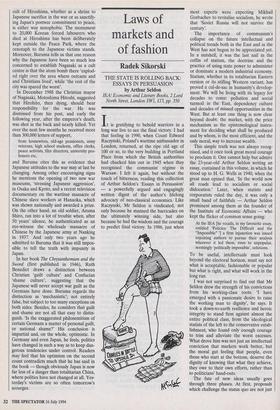Laws of markets and of fashion
Radek Sikorski
THE STATE IS ROLLING BACK: ESSAYS IN PERSUASION by Arthur Seldon lEA1 Economic and Literary Books, 2 Lord North Street, London SW1, £15, pp. 350 It is gratifying to behold warriors in a long war live to see the final victory. I had that feeling in 1990, when Count Edward Raczynski, Poland's wartime ambassador in London, returned, at the ripe old age of 100 or so, to the very building in Portland Place from which the British authorities had chucked him out in 1945 when they recognised the communist regime in Warsaw. I felt it again, but without the touch of bitterness, reading this collection of Arthur Seldon's 'Essays in Persuasion' — a powerfully argued and engagingly written digest of the author's lifelong advocacy of neo-classical economics. Like Raczynski, Mr Seldon is vindicated, not only because he manned the barricades on the ultimately winning side, but also because he had the wisdom and the courage to predict final victory. In 1986, just when most experts were expecting Mikhail Gorbachev to revitalise socialism, he wrote that 'Soviet Russia will not survive the century'.
The importance of communism's collapse on the future intellectual and political trends both in the East and in the West has not begun to be appreciated yet. In a nutshell, it was the last nail in the coffin of statism, the doctrine and the practice of using state power to administer or dominate a modern industrial economy. Statism, whether in its totalitarian Eastern version or its stifling Western variant, has proved a cul-de-sac in humanity's develop- ment. We will be living with its legacy for decades to come: pollution and social turmoil in the East, dependency culture and decades of missed opportunities in the West. But at least one thing is now clear beyond doubt: the market, with the price mechanism as the epistemological instru- ment for deciding what shall be produced and by whom, is the most efficient, and the only moral, way to increase wealth.
This simple truth was not always recog- nised, and it once took great moral courage to proclaim it. One cannot help but admire the 23-year-old Arthur Seldon writing an essay, contained in this volume, in which he stood up to H. G. Wells in 1940, when the great man opined that, 'In the world now all roads lead to socialism or social dislocation.' Later, when statists and corporatists ruled the day, it was only a small band of faithfuls — Arthur Seldon prominent among them as the founder of the Institute of Economic Affairs — who kept the flicker of common sense going:
At the IEA [he recalls, in my favourite essay, entitled 'Policies: The Difficult and the "Impossible"'] a firm injunction was issued enjoining authors to pursue their analysis wherever it led them, even to unpopular, seemingly 'politically impossible', solutions.
To be useful, intellectuals must look beyond the electoral horizon, must say not what is acceptable, fashionable or popular but what is right, and what will work in the long run.
I was not surprised to find out that Mr Seldon drew the strength of his convictions from his working-class roots. 'I have emerged with a passionate desire to raise the working man to dignity', he says. It took a down-to-earth resilience and heroic integrity to stand firm against almost the entire political class, from the ideological statists of the left to the conservative estab- lishment, who found only enough courage to trim and alleviate the worst excesses. What drove him was not just an intellectual conviction that markets work better, but the moral gut feeling that people, even those who start at the bottom, deserve the dignity of knowing that what they achieve, they owe to their own efforts, rather than to politicians' hand-outs.
The fate of new ideas usually goes through three phases. At first, proposals which challenge the status quo are not just rejected but jeered at and abhorred. Then, as the old order loses more and more cred- ibility, the new ideas begin to be debated as possibly having some merit — but, of course, being totally impossible in practice. We may be sure that they have triumphed when its opponents say that they are so Obvious as not to be worth debating, and that in any case they had themselves advocated them all along. Market liberal- ism went through the first phase in the long, lonely night of euphoric collectivism in the 1940s, Fifties and Sixties. The 1970s began phase two. By the 1980s, previously 'politically impossible' privatisation had become commonplace. Today, judging by a recent lead story in the Economist, which advocated the Labour party's wholesale conversion to market ideas, we may soon be approaching phase three. If even the Labour party has nowhere else to turn to for inspiration but the market, then we know that neo-classical economics will be the guiding spirit of the 21st century.
The fact that the battle of ideas has been won hardly means that there is little left to do. If Lady Thatcher's reign was a victory for capitalism — arresting, as she did, the rise of state spending in the economy at Just below half of GDP — it does not bear thinking about what defeat would have looked like. Whether in education, health, or welfare, whole areas of British life are still ridiculously dominated by monopolistic or semi-monopolistic state provision. Private enterprise is stifled in dozens of industries — from housing and garbage collection to education and road-building. Bureaucrats in local authorities, quangos and Whitehall departments still multiply, lying, interfering and pontificating, all in the name of the 'public good'. From food and rents to airline travel and cars, the consumer still pays more than he would without state meddling. Taxes are still at levels which would have precipitated a bloody revolution a century or two ago. Britain has a long way to go towards achieving the ideal of a strong but minimal state. Those of us who argue for capitalism in the East know only too well what it is like to have to argue against ignoramuses who point out that this or that solution must be a market one 'because it's like in the West'.
In area after area, Arthur Seldon provides the arguments and the practical proposals on how to organise things differ- ently, on the basis of free enterprise and free choice. I would particularly recom- mend The State is Rolling Back to Tory MPs and ministers. If they lose the next general election, despite an improving economy, it will be solely because they do not have the courage of their convictions and hence the country's respect. They could do worse to try to regain the fire that drove Lady Thatcher to one victory after another than dip into these superb dispatches from the intellectu- al battlefield.



















































 Previous page
Previous page